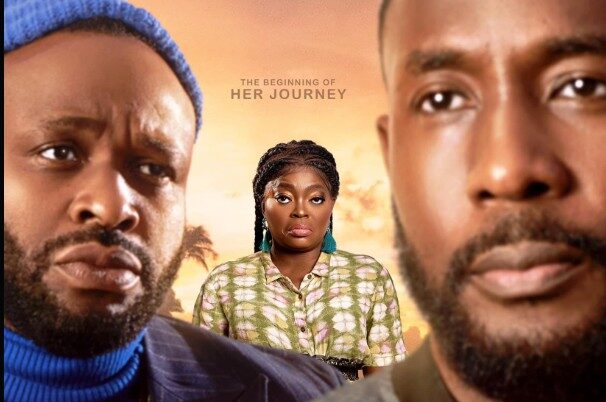Finding Me does not know what it wants to be. Its tone is chaotic, the production rowdy, and the plot overly bloated, with a shocking runtime of two hours and thirty-five minutes.
By Vivian Nneka Nwajiaku
If there is one thing that stays true about box office Queen, Funke Akindele’s films, it is that they are very Nigerian, very Nollywood, for better or for worse. It is difficult to deny the authenticity, diversity and rightfully melodramatic Nigerianness of her storytelling, even where it speaks to a universal theme like A Tribe Called Judah (2023), and even if it sometimes relies on cultural stereotypes as Finding Me (2025) occasionally does, especially in its portrayal of lower-class people.
But it is also easy to see the instability of Nollywood’s growth in her filmmaking, sometimes showing progress, but often withdrawing into old habits. Finding Me falls within the latter group, a chaotic dramedy with a side of romance that has a lot to say about domestic abuse, thinks it is saying something about self-discovery, and is extremely disorganised in the way it says anything.
Finding Me is produced by Akindele (Omo Ghetto: The Saga (2020); Battle on Buka Street (2022); Everybody Loves Jenifa (2024)) who also directs with Isioma Osaje (Japa! (2024)), shares writing credits with four other writers, and stars in the lead role as Atinuke “Tinuke” Phillips, the CEO of a steel company owned by her wealthy but uneducated father (Dele Odule).
Tinuke is also a woman in an abusive marriage with her longtime “sweetheart”, Kola (Joseph Benjamin, at ease as a narcissistic antagonist) until she finds herself entangled with a younger man named Anthony (Efa Iwara).
Finding Me might be about Tinuke, but it opens with a monologue from Kola blowing his trumpet while belittling his wife. It is an unexpected opening that establishes the dynamics of the marriage that is central to Finding Me, but its crassness also hints at the weakness of the film’s dialogue, and its existence is in itself an overindulgence that mirrors the majority of the film–sometimes funny and sometimes bizarre, but entirely unnecessary.

There are at least four different films in Finding Me, disguised as subplots, which either have no reason to cross paths or just do not blend in seamlessly. The most interesting one is a comedy about a family business with a succession drama. Starring Akindele’s Tinuke and Femi Adebayo’s Dotun as siblings (Shaffy Bello plays their mother in an unusual role that requires her to step down her classiness for a more uneducated feel), this one has a one-sided sibling rivalry situation going on.
Dotun is the first child and only son of their parents, the “heir apparent” as he repeatedly calls himself, but has been passed over in favour of his more qualified younger sister. Adebayo is a delight to watch, thoroughly fun as Dotun jostles for the CEO position of the family business, already taken by Tinuke.
It’s a pity that his character and the entire succession “subplot” are reduced to a plot device, remembered only to be utilised in plot twists and coincidences, and a bigger pity that their inclusion has no real impact enough to justify their existence in Finding Me.
There is another comedy about a family running scams and blackmails to fund their emigration plans. This one features Omowunmi Dada as Ndidi, Sharon Rotimi as Ngozi, and Emeka Nwagbaraocha as Ifeanyi, children of Tina Mba’s Mama Ndidi. Theirs is the strongest ensemble in Finding Me, with believable chemistry among the characters and a highly entertaining turn from Nwagbaraocha.
Iwara’s Anthony first appears here as Ndidi’s boyfriend and one of their victims, with Anthony taking money from his sister, Ibiere (Dakore Egbuson Akande) to fund his girlfriend’s family. Benjamin’s Kola shows up briefly, at which point the sub-film–and the entire Finding Me–somehow manages to devolve into a wholly manufactured and badly developed serious crime drama where someone turns up dead, someone gets framed, and none of that means anything at the end of the day.
Anthony is unceremoniously re-introduced in another sub-film, an undercooked romance drama between two hurt people who may only be bonding over pain, at best. Still reeling from his experience with Ndidi and in need of investors for his new business, Anthony finds a distraction and financial assistance in Tinuke.

When Anthony says he loves her, the only reason to believe him is that Iwara portrays him with a yearning that deserves a proper romantic drama, which Finding Me is not. On Tinuke’s part, Akindele goes for a clumsiness that makes sense in a sexually restrained woman who does not consider herself desirable. But awkwardness and chemistry are not mutually exclusive, and Tinuke has no chemistry with anybody, not even her best friend Sarah (played by Omoni Oboli).
In all of this, there is also a social issues drama that touches on domestic abuse, extramarital affairs, misattribution of infertility, and potential paternity fraud. This is the closest to what Finding Me thinks it is, with a title like that–an exploration of a woman’s journey to self as she rises above emotional, financial and even physical abuse, including her lapses and the heinous choices she makes.
We are introduced to Tinuke through Kola’s eyes, in that opening monologue that initially appears to be some sort of promotional video or mockumentary but turns out to be specifically directed at us, the audience. It’s a hatchet job that establishes just how deep-seated his prejudice is, evident in how he lets out a deep sigh when he mentions his wife and how he describes his wealthy businessman father-in-law as an “illiterate billionaire steel merchant”.
Right from the very first scene, the abusive dynamic of Tinuke’s marriage with Kola is emphasised and then re-emphasised, to the point of being overdone and tiresome. The idea is to understand the effect on the film’s leading woman and follow her as she grows and discovers herself.
However, neither Finding Me nor any of its sub-films is really about self-discovery. Instead, the film has worrying messaging, because of its framing and because its title is a misnomer. If this was just a film where a married woman with an abusive husband meets a younger man who treats her right and so has an affair with the younger man–with a title to match–think pieces would still be written, but it might still be understandable.
But this film is titled Finding Me, featuring a leading lady whose abusive husband defines her until she meets a younger man to whom she then transfers both her investment and the basis of her worth, and suddenly, the terrible braid wigs that her best friend has always argued against finally come off.

Finding Me does not even bother to treat Atinuke’s transformation as self-improvement but as a wardrobe change. And that change is not framed as a conscious effort of her own volition or even an effort that gets its strength from a third party, but as a favour to a third party, specifically a man. There is no true character arc, and in an honest sequel to Atinuke’s story, she would eventually be right back where she started as she has not experienced any real growth and still does not truly know herself.
And that is the central problem of Finding Me, its identity crisis. Like its leading woman, Finding Me does not know what it wants to be. Its tone is chaotic, the production rowdy, and the plot overly bloated, with a shocking runtime of two hours and thirty-five minutes.
The best parts of this film are the unnecessary “subplots” that are mercifully frontloaded to keep it entertaining at the beginning. One hour into the film, too much has already happened, and yet, nothing has really happened.
From there on, it stops being funny and becomes repetitive. New characters appear from nowhere, so do new genres. And in the last thirty minutes, the third act, where the conflict should be getting resolved, the film becomes too convoluted with multiple last-minute, head-turning, too-convenient writing inventions thrown in as plot twists.
Maybe the film’s lack of a cohesive vision is a result of its having too many writers. Maybe not. But Finding Me is a prime example of Nollywood’s continuous storytelling and messaging woes, fundamental challenges that the industry desperately needs to surmount. We simply cannot keep pretending that bad plotting is genre bending, that poorly thought-out messaging is revolutionary, or that good themes are all that a good film needs.
Rating: 2/5
(Finding Me is streaming on Prime Video)
Vivian Nneka Nwajiaku is a writer, film critic, TV lover, and occasional storyteller writing from Lagos. She has a master’s degree in law but spends most of her time reading about and discussing films and TV shows. She’s particularly concerned about what art has to say about society’s relationship with women. Connect with her on Twitter @Nneka_Viv



